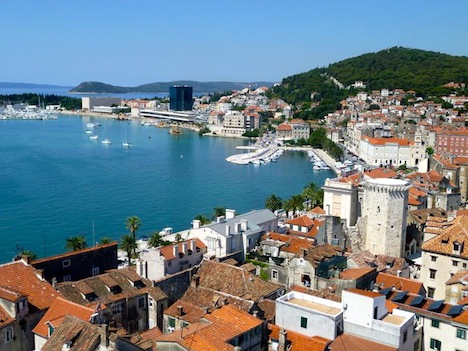Guest post by Michael J. Geary
Croatia on Monday becomes the 28th member of the European Union, marking a historical transformation for a country at the crossroads of central Europe, the Balkans and the Mediterranean.![]()
![]()
The second former Yugoslav country to join the European Union (following Slovenia, also a eurozone member), Croatia declared its independence in 1991, an event that led to the breakup of the union of Yugoslavia, an event that the United Nations and the European Union may have hastened in 1992 Croatia’s independence when they provided international recognition to a sovereign Croatia. At the same time, the Croatian War of Independence broke out between Croat forces loyal to the newly independent Croatia and the Serb-controlled Yugoslav People’s Army and local Serb militia, the latter determined to prevent Croatia from breaking away. Between 1991 and 1995, when the conflict finally ended,more than 20,000 people had died and much of the country was destroyed.
Croatia, however, has marked major progress since the mid-1990s. Successive Croatian governments have edged closer (albeit, sometimes with a gentle nudge from Brussels) to the European Union and the country formally applied for membership in February 2003. A year later, the European Commission endorsed its application, and the European Council granted Croatia candidate status. Enlargement negotiations proved difficult — not least because Slovenia, already an EU member state since 2004, had insisted that certain border disputes be resolved before Croatia could be accepted as a member. The Slovenian veto stalled the negotiations for 10 months in the late 2000s before finally the two former Yugoslav nations agreed to settle border issues bilaterally. Yet the extradition of Croatian citizens to the International Criminal Tribunal for the Former Yugoslavia proved to be a far thornier issue dominating the EU-Croatia enlargement talks. The United Nations established the Tribunal in 1993 to deal with war crimes that took place during the Balkan conflicts of the 1990s. Croatia’s full cooperation with the Tribunal (reluctant at times) was a prerequisite for EU membership.
2013 is a year of contrasts for the EU enlargement process — arguably one its most successful policies, and one of the reasons that the European Union received the Nobel Prize for Peace last year. Aside from Croatia’s pending membership, the European Union is set to open negotiations with Serbia and possibly sign a Stabilisation and Association Agreement with Kosovo after those two countries signed a landmark agreement in April normalizing relations between Belgrade and Pristina after almost two decades of hostilities. Continue reading From Dublin to Dubrovnik: Reflections on 40 years of EU enlargement
